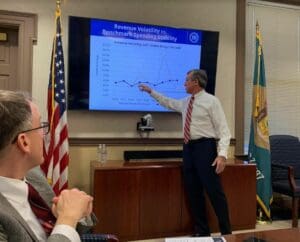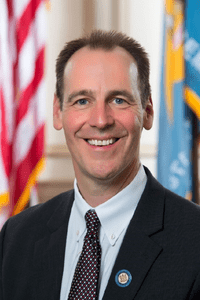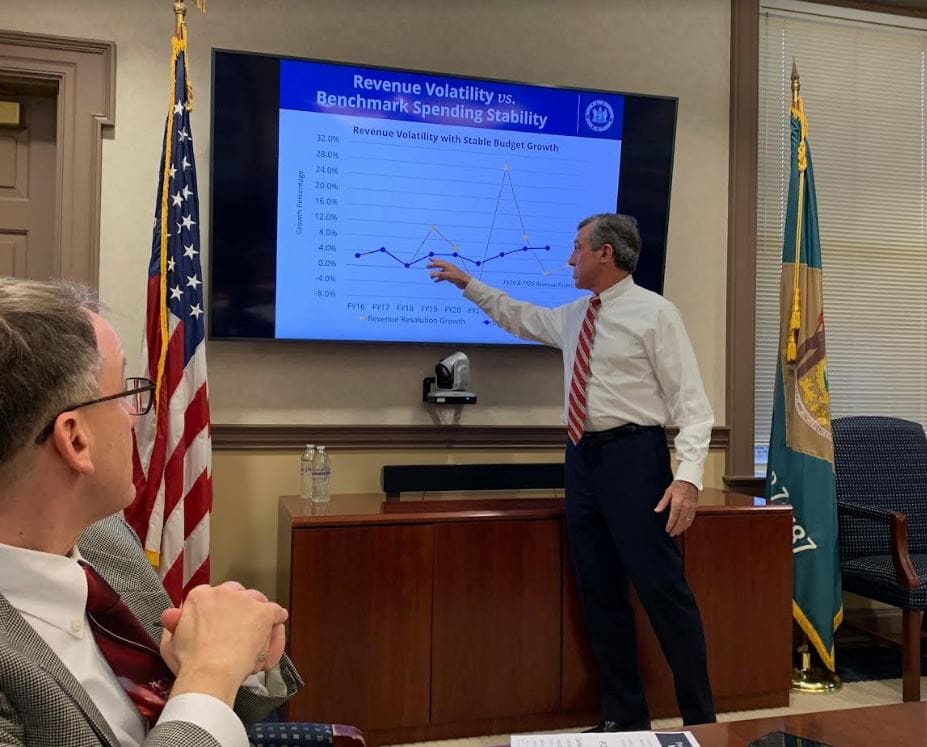

Delaware Gov. John Carney points to a graphic showing the swings in Delaware revenue as Secretary of Finance Rick Geisenberger looks on.
Cutting straight to the “what does it mean to me” point: Gov. John Carney’s $5.5 billion budget proposal for 2024 will let Delawareans keep more of their hard-earned cash.
The budget, which the governor detailed in an 11 a.m speech Thursday, will increase the standard deduction on Delaware income tax by 75% to $5,700 ($11,400 filing jointly) from $3,250 ($6,500 filing jointly.


Gov. John Carney
It also will increase the amount of refunded tax for those who meet federal Earned Income Tax Credit requirements to 7.5%.
Those credits are designed to refund tax to lower-wage earners and are based on tax-filing status, income and number of children. In 2023, the federal credit will be worth $600 to $7,430. The state’s rate is lower.
An example of a group that qualifies would be a three-child household with an income of $60,000.
The change in taxes reflects the state’s third year of $1 billion surplus, fueled largely by federal COVID-19 initiatives and rises in the real estate transfer taxes with home sales soaring after the pandemic started.
Those huge surpluses are not expected to end with the 2024 budget.
Carney’s bill is largely focused on improving education, the environment, raising state worker pay, funding programs that help attract jobs and put people to work through tax breaks and child care assistance, he said.
The budget bill, which must be adopted by the General Assembly before it ends June 30, includes a lot of historic proposals, largely because of those surpluses.
It recommends putting $59.8 million into grants-in-aid, which supports nonprofits; $1.23 million into bond and capital improvements, which provides the state’s infrastructure; and a one-time supplemental allocation of $324.9 million that will go to healthcare issues.
Republican budget reaction
Republican members of the Joint Finance Committee, a bipartisan group that will take Carney’s 2024 budget, said they largely were pleased with it, citing the additions to state funds that help when the state faces deficits, the increase of tax deductions, a focus on affordable housing, increase in programs to help lower-income workers pay for child care, increasing state worker pay, and money for water and environmental issues.
Rep. Ruth Briggs King, R-Georgetown, said Carney showed fiscal restraint by adding to the budget smoothing fund. That and the rainy day fund now contain about $1 billion, which Carney said will help when the huge surpluses slow.


Ruth Briggs King
Rep. Kevin Hensley, R-Townsend, said it made him nervous that the operating budget increase was a percentage point higher than the Delaware Economic and Financial Advisory Committee recommended and he worried that the state should be putting more aside.
He said he was surprised that Carney didn’t put more money into the nonprofit grants-in-aid budget. Many are still coping with losses and expenses related to the pandemic, he said.
“These nonprofits provide critical services to Delaware and throughout the state. They do a fabulous job doing it,” he said. He said he was hopeful that the grants budget could be increased by the Joint Finance Committee.
King said she would have liked to see more money go to public safety.
Traffic accident deaths and pedestrian deaths were up again last year, she said. Schools need more safety money, too.
“I think that’s a primary concern for all of us who are on these very busy highways,” she said.
If the bill to legalize marijuana becomes law, there will be even more expenses, she said. Carney vetoed that bill last year, but it’s back this year.
“So I would like to see a little bit more conversation directed in general to public safety,” she said.


Kevin Hensley
Briggs King noted that the governor didn’t lower the real estate transfer tax, which is now at 4%.
Carney declined to say Wednesday whether he would support a bill that will lower that to 3%. He had been opposed to adding raising it to 4% but said that he now worries that taking it — and revenue of $140 million a year — away could be a problem without big surpluses.
Both Hensley and Sen. Eric Buckson, R-Dover, also a JFC member, are realtors. Sales don’t seem to be slowing down, they said. Mortgage rates have dropped in recent weeks, which experts say will fuel more sales.
Buckson said he would favor a compromise that cut one-half of 1% from the transfer taxes.
Buckson also said he would like to see the 2024 budget focus on needs more than wants right now. That was one of the things Carney said he was trying to do with the budget.
Hensley pointed out that there were plenty of programs Carney felt comfortable adding to funding that are one-time-only expenditures.
“I think it boils down to priorities and I respect his priorities,” Hensley said.
The Joint Finance Committee can and will make changes in the 2024 budget.
Briggs King recalled former Rep. Dennis P. Williams telling her once that “the governor proposes and we dispose.”
He told her during a debate over altering a program 5% that “we argue when we don’t have money … we fight when we do.”


Betsy Price is a Wilmington freelance writer who has 40 years of experience.
Share this Post








